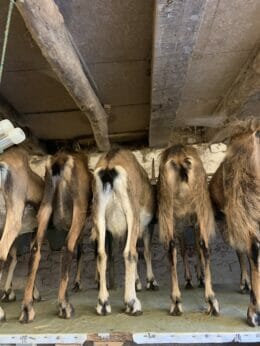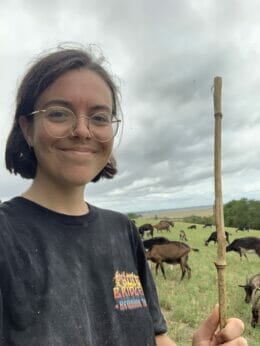The term “peasant farming” describes many small-scale producers, who may or may not own the land they farm. So why won’t the designation catch on in the US?

Last June, I quit my office job and booked a flight to France. I was 24 and dewy-eyed, and I wanted to farm—or, at least, I wanted to try. A few weeks later, I was face-to-face with 64 goat udders, being told plus de force, (less delicately), as I wiped them down for milking. It was a stark contrast to the day jobs I had known before, writing endless emails and leaving voicemails in professional-speak—“Looking forward to hearing from you at your earliest convenience!” Staring down dozens of goats udders, not a meeting agenda or email inbox to be found, I was ready for something new. I would spend the next three months working on farms in France—Normandy and French Catalonia—under the tutelage of “paysans,” a word the farmers I worked for said loudly and proudly and often. It literally translates to “peasant.” But, watching olive-skinned girls pull brown bread out of an ancient wood-fired oven or freckled winemakers rub the belly of a 700-pound pig, I was no longer entirely sure that I knew what that word meant.

Photography courtesy of Nicole Grennan.
The 2021 UN Declaration of Peasants Rights defines a “peasant” in part as anyone who practices “small-scale agricultural production for subsistence and/or for the market” as well as having “a special dependency on and attachment to the land.” The farm in Normandy where I worked for six weeks was designated formally as a “paysan boulangerie.” That farm is a collective, formed by friends who had worked together for many years in Switzerland. They don’t own the land or the bakery, but they are the proprietors of their business, baking bread and making cheese to sell directly on the farm and at the Saturday market in town.
In the bakery, mornings began with tea and toast and The Adventures of Tintin. Some evenings before the wheat harvest, we walked through the fields at dusk, crunching kernels between our teeth to check if they were ready yet. At various points during my stay, the two main farmers, Marie and Vincent, would lob advice at me. Vincent would tell me that it’s better, in some ways, to rent the land you work. He explained that it was because he didn’t have to pay for all of the things that needed to be fixed, he was more free financially because of it. (Importantly, the right to lease agricultural land in France is heavily regulated by the government, explaining why French farmland remains cheaper to buy or to lease than farmland in the rest of Western Europe and is still dominated by mid-sized family farms.) Marie would tell me that she felt liberated by working the land, with friends, doing what she loved, and that, while she couldn’t travel as often or as far as someone with a more “conventional” job, she was free.
Sitting in the field, watching the goats graze, it occurred to me that they do this for a living. I was only a visiter, but this was their life. Could this be my life, too?
As an American farmworker, it’s hard to say. Movements in France such as the Confédération Paysanne, a farmers’ union affiliated with La Via Campesina (the International Peasant’s Movement), support accessibility to farmland. The vigneron (someone who grows grapes for wine making) for whom I worked in French Catalonia was heavily involved in his local Confédération Paysanne. On the first night of my stay with him, we attended a paysan market in the village, where we drank local Muscat so sweet it hurt our teeth and danced to an all-women brass band who watched, smiling, as I later learned how to play petanque. It was a community of small farmers, where everyone either was one, loved one or fed their family via one.
Government regulation and farmer organizing make it so that people such as the farmers for whom I worked—some of whom were new farmers, none of whom were wealthy—are able to buy or lease land to farm. While France certainly struggles with the influence of large-scale agribusiness, it is nowhere near the scale of the US, where farms are about 2.6 times as large (in hectares) as those in France. The US is often regarded as a primary culprit of agribusiness, the bad influence dislocating small farmers across the world as other nations get inspired in all the wrong ways.
In the US, the word “peasant” remains derogatory, tending to conjure dark, dreary images of the Middle Ages, of pre-industrial agriculture in Europe. The lineage of farm labor in the US is also remarkably different from that of mainland France, where peasants were responsible for the French Revolution of 1789 and the consequential overthrow of the ancien régime. In contrast, the American farmworker of today evolved from enslaved Black persons at the foundation of American history, leaving a legacy of a lack of laws or policies that guarantee overtime pay for farmworkers, the right to strike and the right to collectively bargain in the form of a union. Meanwhile, farmwork is the most dangerous job in the United States—twice as deadly as law enforcement and five times as deadly as firefighting. This lineage may also be why we recoil at a word such as peasant; identification with the word “peasant” would require a reckoning with the devaluation of farm labor in the US.

Photography courtesy of Nicole Grennan.
Upon returning to the US, I was fortunate to find a seasonal job that I love, picking apples and making cider in New York’s Hudson Valley. It was a relief to keep doing farmwork for people who deeply value the land and what it produces. But, in my small time as a farmworker, this is my first job working for someone who doesn’t “own” either the operation or the land. It is owned by a kind, thoughtful couple who certainly value the land, its bounty and its history—evidenced especially in the people they have hired (my boss, the winemaker and the orchardist) to maintain the cidery and the farm. But these owners live in another state. While this farm predates COVID by quite a few years, it qualifies as a “boutique farm,” wherein wealthier people buy farmland, drive up land prices and outsource labor to work the land. The phenomenon of boutique farming has seen a huge uptick in the Hudson Valley since 2020, further complicating the challenges already faced by farm laborers in the region.
I don’t fault the owners of my farm for wanting to own the land and start a business and then realizing they actually need to sustain other jobs and priorities at the same time. It is the time-old realization that the idyllic dream of farming often doesn’t work here. It’s this system that makes it challenging, if not impossible, for the people who run this farm in the day-to-day to have their own land or business, because they don’t necessarily have the wealth or resources to do so.
My experience remains limited. The French paysans for whom I worked, all of whom were the proprietors of either the land or the business or both, were white men; if there were multiple proprietors, at least one was a white man. This is important to note because, even in France, where farmland is statistically more accessible to the average person, people of color and women continue to face significant challenges leasing or owning farmland.
The orchardist on my farm recently spoke to me about pruning the apple trees: “When you’re in the bush, really looking at the tree, listening to the tree … that is the highest form of freedom.” It made me think of the sensation I had on that first evening on the farm in Normandy, milking the goats in a place where I knew no one, where no one knew me, where I was delicate when I needed to be firm. There was a sense of freedom there. The thing about the butt of a goat is the abyss looks back.
I wonder at the characterization of American farmers having their root in slavery. My European ancestors on one side immigrated from Germany in the 1850s to become farmers, and from the other side from Spain in the mid 1500s to become farmers (in new Granada). A friend of mine has ancestors who came over on the Mayflower to introduce a long line of farmers.
I am sure that the WEF and Davos group LOVE the little people embracing the word “peasant.” After all, that’s how they view you.
Interesting article, many factors in play here, I have a farm in upstate ny and have attempted to attract labor as a partner, not necessarily an employee. Several options available, I currently grow specialty mushrooms, and also have over 100 acres available, currently in hay due to demands of the perishability of mushrooms. I would like to hear from interested, and serious individuals. Gary wiltbank
I used to haul produce (squash, Blackberrys, cucumbers, jalapeños, and okra) as a merchant from farms in South Texas to the farmers market in Dallas Texas. I made two trips a week for 90 days. The farms I picked up from were small farms. No more than 10 acres each. The produce I received was ALWAYS 5 star quality. I sold the produce to warehouses,private customers, and to buyers for 5 star restaurants. Not one piece of produce I have ever seen at the local grocery store could compare to the produce I received and sold. My produce was so… Read more »
What a wonderful article. I owned a 40 acre in Nebraska and raised animals for my consumption as well as selling them off the farm. My dairy goats were the center hub. They provided my milk and cheese, as well as superb nutrition for pigs, and calves I bought from a feedlot when they were born as surprises from open cows. Bum lambs thrived on the milk, getting fatter and happier every day. Even the chickens waited patiently (not!) for their share. I would love to think of myself as a peasant, past, and hopefully someday I will be a… Read more »
Nice article. Big agro in America is corporate owned farms…not always American owned either. America loves money animals & people get low status to American business both are expendable. Soil is trashed from hundred plus years of over farming, use of synthetic fertilizers and ignorance of the fallow farming management. It’s not about healthy quality food, dairy, or livestock…its ALL about money profit thru control & regulation. Control thru debt, regulation thru price controls, fake diseases and government subsidies along with conclusion with corporations owning GMO seeds & chemicals.. MOTHER NATURE CONTINUES TO REBELL. Our food sources world wide are… Read more »
It’s a wonderful article.
“(T)he American farmworker of today evolved from enslaved Black persons” . . . um, no. No idea where you got this information from, but it’s not correct. Stop viewing everything through the prism of skin color. But I agree that in the U.S. no farmer wants to be called a “peasant.” The term implies extreme poverty, ignorance, and a social status only slightly above cattle.
To say that today’s farm in the US are the result of slavery past is past is completely false. Today’s farms have had no benefit from past slavery. I know I al a farmer as are all of my family. Our family came to the US in the late 1800,s. We are large farms because our family stayed together and worked for generations to build it. Nothing has been easy hard work for generations is all that made it happen.
Why don’t Americans embrace something else that’s popular in France?
Maybe because we aren’t French?
Viva la defference!